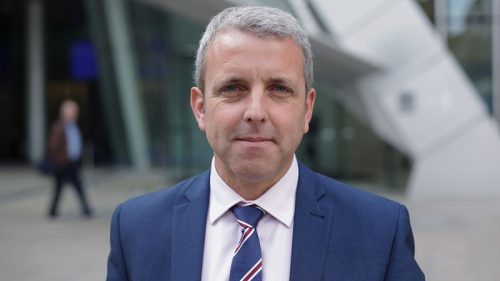The North is crying out for a major scheme to link its cities

Steve Gillingham sums up why the North is crying out for large-scale infrastructure investment to link its great cities and the prize that constructing its connectivity will deliver.
“If I want to put staff on a project in Sheffield from Manchester, some 35 miles apart, I’ve probably got to relocate them,” he says. “Commuting isn’t feasible.”
Gillingham is head of international consultancy and construction company Mace’s northern operations and sits on the board of the Northern Powerhouse Partnership.
He says improving commuting times between places like Bradford and Leeds is fundamental to the future economic fortunes of the North of England.
Investment is long overdue. “The fact is we are still reliant on what were Victorian infrastructure projects,” he says.
Transport for the North (TfN) is looking to change that. England’s first sub-national transport authority has a long-term vision for the region’s railways which will see a rolling programme of investment through to 2050.
Campaigners say it has the potential to create 850,000 additional jobs and add an additional £100 billion to the UK’s economy.
The vision is Northern Powerhouse Rail network linking the region’s six major city regions and its largest airport with faster, more frequent high capacity services.
Other major infrastructure projects being considered include the construction of a trans-Pennine road tunnel.
Major investment will be needed. A report on how to finance and fund the Northern Powerhouse issued by The Institute for Public Policy Research think tank and Squire Patton Boggs last year highlighted the challenge.
Analysis of the national infrastructure pipeline showed that 35 per cent of total infrastructure spending and 54 per cent of all transport infrastructure spending in the UK taking place in London.
Gillingham describes TfN’s statutory status, gained in April, as a “trigger point”. However, unlike Transport for London, it does not have the ability to generate its own income.
That needs to change, Gillingham says. “What they need now is control over the budget. They still need to persuade government about that budget coming north.”
It is a point taken up by Andrew Herring, partner at Squire Patton Boggs. He says: “In the past the talk has been about investing in infrastructure to kick-start the post industrial economy.
“Now it’s about trying to get the infrastructure to keep up with the growth that is already there. It is a different argument. It is increasingly about ‘how do we deal with success?’
“The really significant thing is how you put some funding power behind these increasingly devolved institutions we have.
“Transport for London has got very significant powers to raise its own money. It can define and deliver the projects it needs to support London’s growth. And that isn’t yet the case for Transport for the North, for example.”

Giles Taylor
Giles Taylor, head of property and construction in the North of England at KPMG, sums it up when he says: “You can’t have a successful Northern Powerhouse without successful Northern transport.”
Plans to invest in improving North-South connectivity are moving forward, with the HS2 rail plan firmly on the drawing board.
And that is already having an impact. Gillingham says: “We are starting to see masterplans around hub stations such as Manchester, Sheffield and Leeds.
“There are no cranes in the sky yet but people are investing money into putting these plans together.”
Gillingham also points to some what he calls “out of the box” infrastructure development ideas. They include proposals to create a series of free ports across the North.
A recent report says that “supercharged” free ports, offering relief from customs and import tariffs together with enterprise zones that have tax incentives to boost investment, could deliver a multi-billion pound boost to the economy and create tens of thousands of jobs.
To make that vision a reality would require more large-scale investment but Gillingham believes it could be another real opportunity in a post-Brexit world.
“It’s great having all these ideas,” he adds. “We need to see some of these projects coming forward so that companies can make the investment in people and skills.”
Creating the foundations for growth
The Department of Transport says its figures show that spending in the north over the next three years will actually be higher than London and the south of England.
It says that between 2018 and 2021, it will be investing £831 per head on road and rail upgrades in the North East, North West and Yorkshire and the Humber – more than £30 more per head than London and the south at £799.
Government minister Baroness Sugg said: “We are investing more than £13bn to improve connections across the north between 2015 and 2020, getting people to their work, family and friends, quicker and easier than before.
“This investment demonstrates the government’s commitment to the Northern Powerhouse, which will help unlock economic growth and much-needed housing across the region”.
The DoT says more than £1bn is being spent on improving the north’s rail network with further investment through the Northern and TransPennine Express franchises to deliver room for 40,000 more passengers to travel on over 2,000 more services a week.
The government also plans to invest a further £3bn upgrading the Transpennine rail route, better connecting Manchester, Leeds and York.
And as part of the government’s commitment to Northern Powerhouse Rail (NPR), it says Transport for the North has been given £60m to develop proposals for the scheme, alongside investing £300m to ensure HS2 can accommodate future NPR services.
The final section of the M62 upgrade between Leeds and Manchester is expected to start construction in 2019-20, leading to quicker, safer and more reliable journeys.
The DoT also points to Sheffield’s new tram-train project and the A6 Manchester Airport Relief Road as its commitment to infrastructure development.









